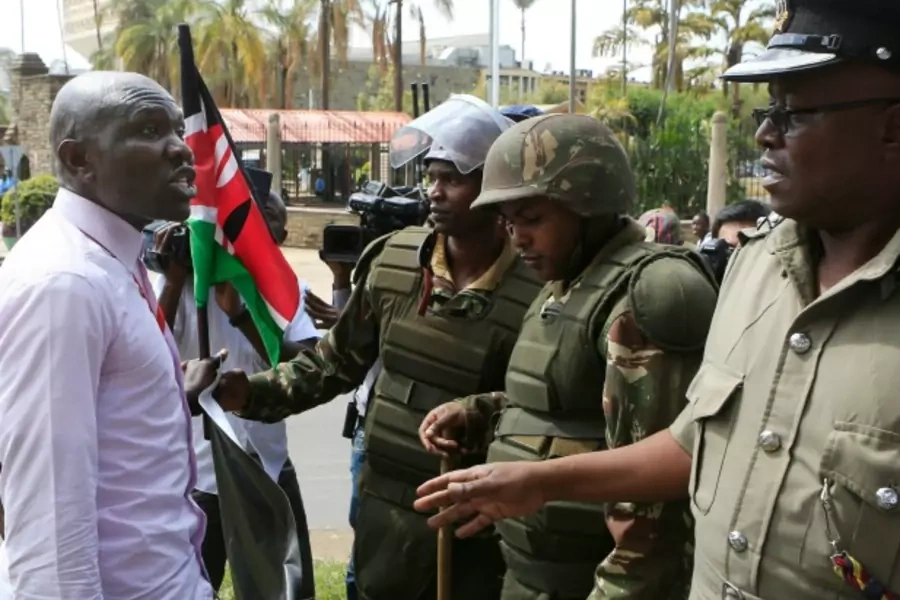Kenya’s Troubling New Anti-Terrorism Legislation

More on:
This is a guest post by Aala Abdelgadir, research associate for the Council on Foreign Relation’s Civil Society, Markets, and Democracy Initiative.
In mid-December, the Kenyan parliament passed counterterrorism legislation that has since been hotly contested by politicians, civil society leaders, journalists, and ordinary citizens alike for its alleged infringement on basic civil liberties.
Since al Shabaab’s bold and bloody siege of Nairobi’s Westgate shopping center in September 2013, the government of President Uhuru Kenyatta has been under pressure to upgrade its security and counterterrorism framework. Al Shabaab’s campaign against civilians, government officials, and police and security forces across Kenya has continued, culminating last month in two assaults in the northeast that left sixty-four dead.
The newly passed Security Laws (Amendment) Bill 2014--President Kenyatta and his supporters’ response to al Shabaab--grants government agencies and security forces expansive powers to enhance counterterrorism efforts. Yet, these security measures have incited intense criticism. Leaders of the opposition coalition, the Coalition for Reforms and Democracy (CORD), view the law as a bid to consolidate political power and an attempt to roll back hard won democratic gains in Kenya. CORD’s Raila Odinga petitioned Kenya’s high court to suspend the bill for its unconstitutionality and spoke out publicly against the law, arguing this is “how dictatorship and collapse all begin.”
Certain aspects of the bill have also prompted serious scrutiny from outside the political arena. Notably, the law expands the powers of security forces, which Human Rights Watch fears will violate citizens’ right to due process. It extends the length of time terrorism suspects can be detained without charge from ninety days to almost a year, and it enables National Intelligence Service officials “to stop and detain suspects, search and seize private property, and monitor communications without a current warrant.”
Additionally, the law imposes restrictions on the press, requiring journalists to receive approval before beginning investigations or publishing stories on issues of domestic terrorism and security. Journalists, civil society organizations, and activists fear the government will use the law to diminish the free flow of information and to protect security forces from public scrutiny.
Foreign governments and international organizations have also criticized the security law. In particular, Human Rights Watch and Amnesty International denounced the bill’s infringement on basic rights and called attention to articles restricting the freedoms of assembly and association. U.S. Department of State Spokesperson Jen Psaki echoed similar sentiments and expressed particular concern over the provisions that “appear to limit freedom of assembly and media, and access to asylum for refugees.”
In light of recent events, Kenya needs to mount a robust counterterrorism campaign against al Shabaab, but this security bill is far from the answer. While internal critics see it as a threat to democratic governance and freedoms, the bill also has important security implications. The expanded surveillance, search and seizure, and detention powers in the new bill will allow the security forces to escalate one particularly controversial aspect of current counterterrorism efforts: collective targeting of Muslims and ethnically Somali communities. From indiscriminate arrests and mass round-ups to assassinations of Muslim clerics, security forces’ use of collective punishment has been well documented. Already, this strategy has fermented a sense of injustice and exclusion among Muslims and ethnic Somalis. Continuing on this trajectory will only further alienate these communities and exacerbate radicalization by driving marginalized citizens into the open arms of al Shabaab recruiters.
While it may seem that the Security Laws (Amendment) Bill is purely a domestic Kenyan issue, Kenya’s national counterterrorism strategy affects the entire region. Kenya’s efforts could either help curb al Shabaab or provide them fertile recruiting ground, and thus have profound implications for U.S. interests in maintaining regional security in the horn of Africa and preventing Somalia from turning into a hotbed of terrorist activity.
More on:
 Online Store
Online Store